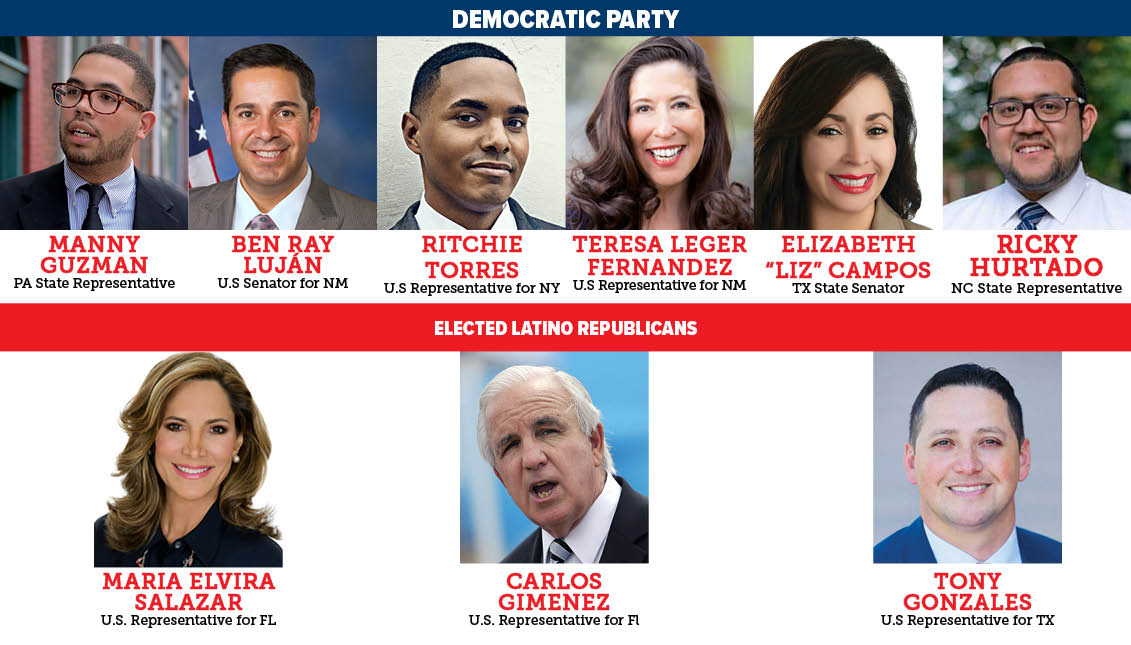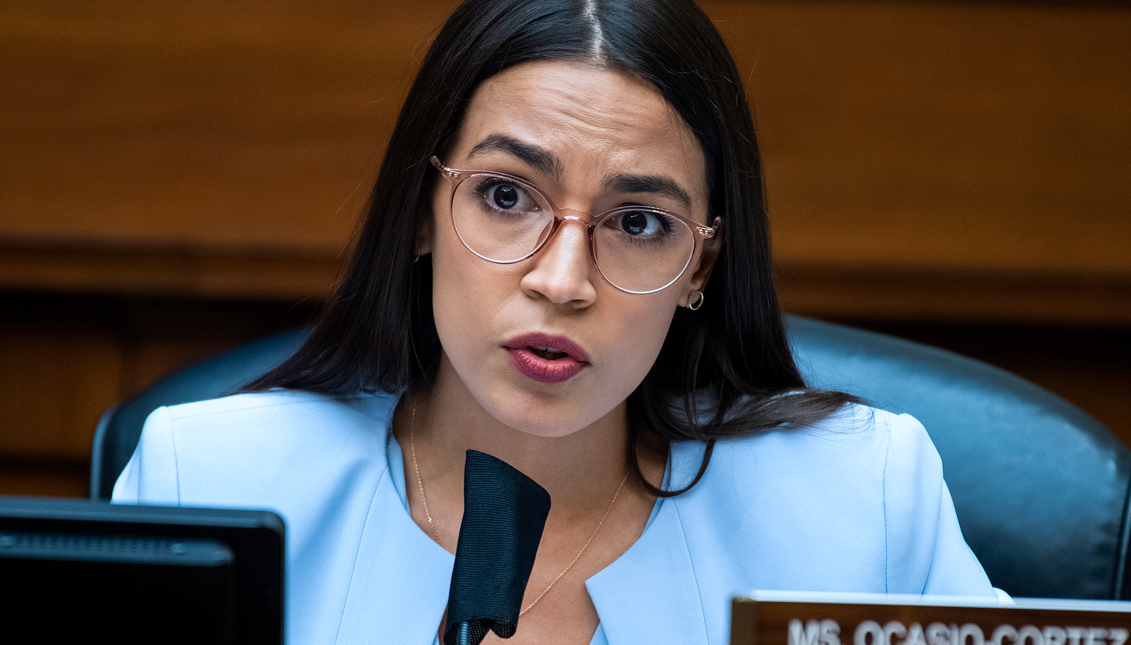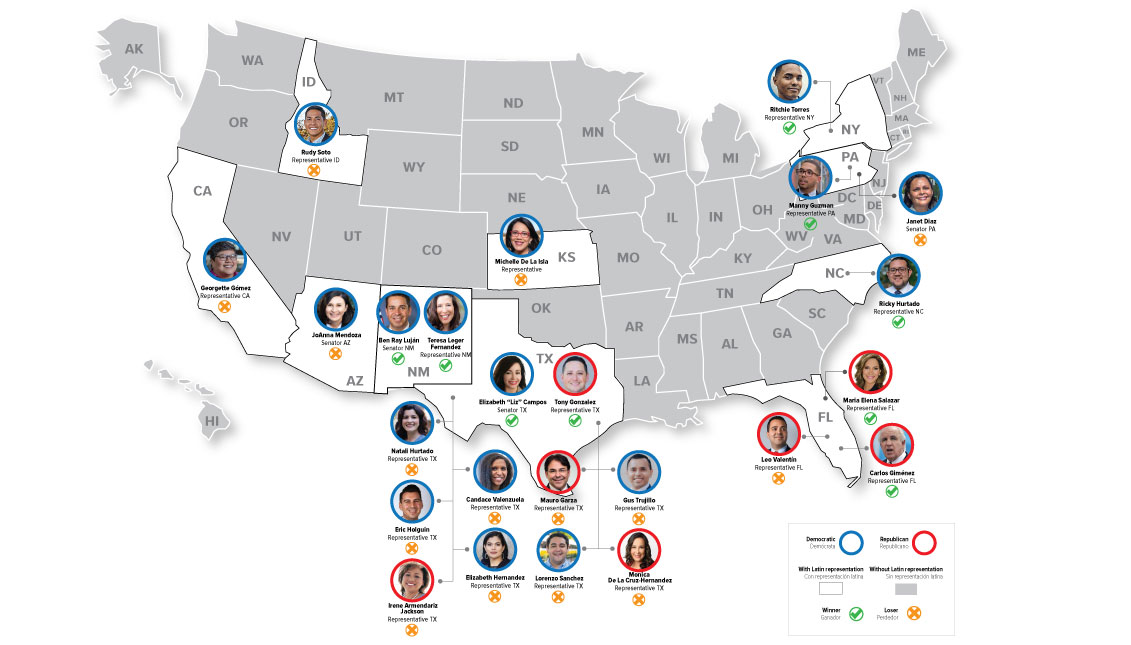
Elections 2020: The Next Generation of Latinx Leaders
A Latinx cohort that changes the face of national politics across the board, from the PA to NM.
History will remember the 2020 Election as the moment when the direction of the United States changed forever.
A tumultuous week full of misinformation, tension, anxiety, and unexpected results, showed that U.S. citizens have become aware of the strength behind their demographic diversity.
With an anticipated turnout of more than 90 million votes, the country had already broken records by Election Day, and it only became more evident as the hours passed on Nov. 3. Endless lines of people waited to exercise their democratic right and the amazing organization of activists and community members were just some of the most powerful events of the entire day.
Finally, with the announcement of the Biden-Harris campaign's victory on Saturday, the bells rang out from New York to Paris, in a celebration directly proportional to the sigh of relief that lifted an overwhelming weight from the world's shoulders.
However, the Latino vote was on everyone's lips, especially after the results were announced in favor of Donald Trump in Florida, and the ideological shift in Arizona, both of which were driven by the massive participation of Hispanic voters.
The dichotomy surprised those who, at this point, still believed in the myth of the monolith — assuming that the Latino community in the U.S. functions as a solid block — and demonstrated the fractures that still exist in political strategies when it comes to approaching the complex dynamics of what is today, the largest ethnic demographic in the country.
The organization Voto Latino had registered around 600,000 voters for the 2020 election cycle, 73% of whom were between 18 and 39.
Earlier this week, the group released its latest statistics on Latino voters, with a particular emphasis on the surprising participation of young people, finding that about 8.2 million Latinos had voted, compared to 3.7 million Latinos who voted in 2016.
"In early voting, Latinx participation is at its highest level, with 6,810,948 votes cast, compared to 3,710,270 cast at this time in 2016. In Pennsylvania, early voting for Latinx is up 840% compared to 2016," the organization reported.
That same participation was reflected in the leaders chosen to represent the community at the tables where decisions are made.
Bronx Latino Congresswoman Alexandria Ocasio-Cortéz was one of the Latinas to win re-election last week. With a message on Twitter, the 31-year-old Democrat and the new cover model for the December issue of Vanity Fair, thanked her community for her re-election as a congresswoman from New York's 14th District.
"Thank you to the Bronx and Queens for re-electing me to the House despite the millions spent against us, and for trusting me to represent them once again,” she wrote
Ocasio-Cortez has been more cautious about the close presidential election, although no less triumphant about what she has achieved with her party. In a recent interview with Vermont Senator Bernie Sanders, AOC said that it doesn't matter which candidate wins because the progressive platform has achieved its own triumph: the generational moment.
"The fact is that the momentum is on our side and we're winning, and we've won the generational argument, and the millennials are radicalized," added the legislator who, a few weeks ago, took the plunge to play Among Us, the most popular online game of 2020, to call the millennials and Gen Zers to the polls.
The strategy, it seems, had an impact on young voters. According to Tufts University's Center for Information and Research on Learning and Civic Engagement (CIRCLE), their participation this year was record-breaking: just one day before the election, more than 10 million people between the ages of 18 and 29 had voted early.
A CNN poll also showed that 51% of Americans in that demographic age group showed "extreme" enthusiasm for participating this year, compared to 30% in the 2016 election.
However, the national phenomenon of Casio-Cortez may also have influenced the new generation of Latino elected officials who, inspired by his political savvy, threw their hats in the ring and emerged victoriously.
These are the Latino champions of the 2020 Election and the new generation representing the most crucial voting group in the country.

In a decisive victory against Republican Mark Ronchetti, Representative Ben Ray Luján has secured his win for the other New Mexico Senate seat alongside Democrat Martin Heinrich.
In the Senate race, Rep. Luján (NM-3) is joining the upper levels of Congress, but also affecting subsequent movements within the Hispanic Caucus. Luján is the current Assistant Speaker of the House since 2019, therefore the highest-ranking Latino in Congress. With his victory over Ronchetti, the impacts are profound.
After winning a tightly contested primary this summer, Ritchie Torres went on to a resounding victory on Tuesday over his Republican opponent in New York's 15th District, a Democratic stronghold centered in the Bronx. Torres, 32, will become one of the first openly gay Black men to serve in the House, along with Mondaire Jones, Tuesday's winner in New York's 17th district.
Teresa Leger Fernandez
Fernandez just became the next representative from New Mexico's 3rd Congressional District, becoming the first Latina to ever hold the position.
She will become the first woman to hold the seat of the 3rd District since its inception in 1983, where registered Democrats outnumber Republicans nearly 2-1 in the district, which overlaps parts of the Navajo Nation and other Native American communities.
RELATED CONTENT
Democrat Ricky Hurtado prevailed against Republican representative Stephen Ross in the 63rd District of North Carolina for the state’s House of Representatives, by a margin of 50.5% to 49.5%. The total vote was 20,264 for Hurtado to 19,869 for Ross.
Hurtado is now the first Latino elected to the North Carolina House.
While North Carolina is only 4.4% Latinx, his promotion to the House is a victory for Latinx representation, regardless of party lines. With those demographic levels, his success is great for Mexican-Americans underrepresented in the country's political landscapes.

Owner of a plumbing business and with experience in the legal field, Elizabeth "Liz" Campos was the Chief of Staff for former San Antonio Senator Carlos Uresti. She entered the Democratic nomination for District 119 by defeating Jennifer Ramos in the July runoff by 923 votes, or 13%.
Facing Republican candidate George B. Garza, Campos won with 62.6% of the vote.
When Manny Guzman first ran to represent Reading, PA’s District 127 in Harrisburg, he lost by a mere 150 votes to a longtime incumbent in the Democratic primaries. Two years later, when that same incumbent retired, Guzman’s opportunity came calling and he took full advantage.
After triumphing early, Guzman will go to Pennsylvania’s state house as the first Latino to ever rep Reading. For this city, which is 66% Latino and rising, Guzman’s victory is a signal of the changing political power both in the city of Reading, state of Pennsylvania and country as a whole.
Republican Maria Elvira Salazar defeated current Democratic Representative Donna Shalala in Florida's 27th Congressional District in a defeat that neither party anticipated on Election Day.
Salazar, a former television journalist, won her race against one of Miami's best-known politicians by linking Shalala to leftist Democrats such as Vermont Senator Bernie Sanders. He also hammered Shalala repeatedly for failing to disclose stock transactions while in office and characterized her as a contactless millionaire who could not connect with the working-class voters of the district.
The Mayor of Miami-Dade County, Florida, Carlos Gimenez, won 52% of the vote against incumbent Debbie Mucarsel-Powell and became the new Representative of the 26th Congressional District of Florida, which includes Monroe County and part of Miami-Dade.
"Today was a rejection of extremism, today was a rejection of partisanship and today was a rejection of socialism," said Gimenez. "This country needs to start working together because it has threats both at home and abroad.”
Republican Tony Gonzales, a former Navy cryptologist and professor at the University of Maryland, sang victory in a close race to fill the vacancy left by Rep. Will Hurd in Texas' 23rd Congressional District, dashing the Democrats' hopes of winning the seat.
The San Antonio native had been endorsed by President Donald Trump and was part of the Republican National Campaign Committee's "Young Guns" program, which aims to recruit and support candidates in battleground districts.











LEAVE A COMMENT: